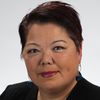In my last column I wrote that the novel coronavirus outbreak showed us the gaps in our social safety net and the systems that we urgently need to fix.
But what this crisis has also exposed in the past week is the way in which people, guided by their hearts, are stepping up to support each other in extraordinary ways.
People like Yadesa Bojia, who is a Seattle-based artist and University of Washington graphic designer. Bojia recently became alarmed after talking with other Ethiopian American community members in his first language, Amharic, and realizing there was a lack of solid, scientifically grounded information about the coronavirus getting out to the community. Some people he talked to thought the disease was airborne, others thought it could be cured or prevented with traditional herbal medicine or stopped with vitamin C. Bojia knew that Public Health – Seattle & King County created coronavirus fact sheets in multiple languages, but didn’t think people in his immigrant community would know where to find them.
So on March 7, Bojia decided to do something about it. Armed with the Centers for Disease Control and Prevention’s public health guidance, he started a Facebook live video to read recommendations for the community in Amharic. To his surprise, the video has been viewed 2,000 times and counting. Getting this information out, Bojia said, is “a matter of life and death,” for not just the nearly 25% of King County that are immigrants but the entire community.
Bojia is just one of many across the region who have lent their resources to help others during this unprecedented time. This pandemic has upended every part of our daily lives and sent social, economic and political shock waves throughout our society. Fear might bring out some of our worst instincts, but crises bring out the best in humanity as well.
In the days since the Seattle area became the epicenter of the outbreak, the outpouring of support has been moving and inspiring. On an individual level, people have offered free babysitting, cooking and food delivery for harried parents and medically vulnerable older adults.
After racist coronavirus fears drove down business in Seattle’s Chinatown International District, Bill Tashima, a board member for the local Japanese American Citizens League, created a Facebook group on Sunday to share ways to support small restaurants. Within days, the group had nearly 5,000 members, sharing ideas for restaurant takeout to boost business in the struggling district and creating a virtual “tip jar” that one member was using to collect donations for restaurant workers.
The artistic community, which already experiences economic insecurity in good times due to unpredictable contract-based work, saw all public events canceled like dominoes in the past week. Seattle-area author Ijeoma Oluo quickly set up a GoFundMe on Monday to raise and distribute funds for artists. Within days, the fund raised $80,000 and distributed $10,000 and was in the process of distributing another $30,000 to artists directly impacted by loss of income due to the coronavirus. Another group of people started a live-performance streaming site on Facebook called “The Quarantine Sessions,” where artists can perform and the audience can tip the band before their performance starts.
To support those who are most vulnerable in an emergency, a grassroots effort formed in Seattle called “Covid19MutualAid,” centered on people with disabilities, people of color, undocumented people, older adults and others. In addition to recruiting volunteers for direct support such as food and grocery deliveries, the group is also advocating for systemic changes that would make communities less vulnerable in the first place.
When Seattle Public Schools announced Wednesday they would be closing abruptly the next day, people across the city jumped into action, knowing that for the 32% of Seattle school district families that are low income, school lunches are a critical part of how children stay fed. Volunteers and staff distributed school lunches for pickup at Highland Park Elementary in West Seattle on Thursday and in Rainier Beach, Washington Building Leaders of Change or WA-BLOC and food justice organization FEEST planned a free hot lunch called “Feed the Beach” for families on Friday with additional lunches twice a week after that.
These are just a few of the many grassroots efforts that are just getting started in our region. Larger entities like the Seattle Foundation are also taking action, with rapid response resources like the COVID-19 Response Fund quadrupling to $9 million in a few days.
The coming months will challenge us in ways we have never before imagined. But if we continue, as writer Sonya Renee Taylor said, to “put radical love into practice,” we might emerge stronger than we began.
______
Editor’s note: The spread of novel coronavirus has left the state of Washington in a state of uncertainty. But amid the growing pandemic, members of the community have shown remarkable acts of kindness and efforts to take care of each other. From crowdsourced relief funds for local artists, to readers sending our own newsroom pizza after a long day, many people are rising to the occasion to uplift one another. Tell us your stories in the form below, and we’ll gather the best of these stories for publication.
